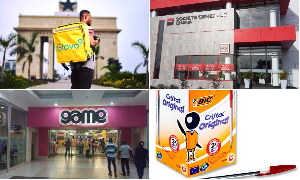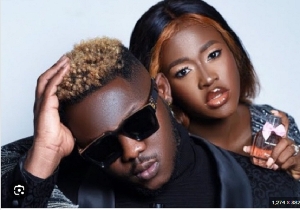- Home - News
- TWI News | TV
- Polls
- Year In Review
- News Archive
- Crime & Punishment
- Politics
- Regional
- Editorial
- Health
- Ghanaians Abroad
- Tabloid
- Africa
- Religion
- Election 2020
- Coronavirus
- News Videos | TV
- Photo Archives
- News Headlines
- Press Release
Business News of Friday, 14 December 2007
Source: GNA/GHP/Pana
Ghana joins rush to secure EU trade
... break ranks with position of ECOWAS
Accra, Dec. 13 - Ghana on Thursday signed the controversial interim Economic Partnership Agreements(EPA) or EPA-lite with the European Commission, despite opposition from pressure groups such as the labour movement and civil society organizations.
The agreement will provisionally allow 80 percent of some European goods into the Ghanaian market duty-free and quota-free while Ghana will continue to have 100 percent access to the EU market, except sugar and rice.
According to a Reuters report:
"Ghana is joining a rush among poor countries to safeguard exports to the world's biggest trading bloc after preferential terms expire at the end of the year."
"Brussels had hoped to sign WTO-compliant economic partnership agreements (EPAs) with six regional blocs covering a host of trade and investment issues, but talks with West Africa and other regions missed the deadline, leaving those countries worst-affected, such as Ghana, scrambling for an interim deal."
Mr Joe Baidoe-Ansah, Minister of Trade, Industry, and the head of the EU delegation in Ghana, Filiberto Ceriani Sebregondi, initialled the deal, which they described as a Stepping Stone Economic Partnership Agreement (EPA), at the Castle, Osu.
It covers goods only and will be replaced by a comprehensive EPA when it is concluded.
The World Trade Organisation (WTO) deems favourable EU trade terms for nearly 80 African, Caribbean and Pacific countries illegal and a waiver expires on Dec. 31.
The EU had hoped to sign WTO-compliant EPAs with six regional blocs covering a host of trade and investment issues, but negotiations with West Africa and other regions have missed the deadline.
"This stepping stone agreement helps therefore to avoid serious trade disruption between Ghana and the European Union," said Mr Joe Baidoe-Ansah, whose portfolio also covers Private Sector Development and President's Special Initiatives.
Ghana has become the second West African country to sign an interim agreement, as developing countries rush to prevent disruption in their exports to the EU, the world's biggest trading bloc.
Neighbouring Ivory Coast was the first in the region to initial an interim trade deal in goods last week, in a move some said broke ranks with the position of the Economic Community of West African States (ECOWAS) that the deadline should be extended to allow for broader negotiations. But ECOWAS Commission President Mohamed Ibn Chambas told the Ghana News Agency in an interview that the community supported specific interim arrangements to allow exports of goods only to continue, so long as they did not pre-empt talks on a broader regional EPA text. "We definitely do not object to these individual negotiations with the EU, while we continue to engage our European partners in order to resolve the thorny issues around the substantive EPA," Dr Chambas said, adding that regional-level talks would resume on December 17. He said both Ivory Coast and Ghana had assured his Commission that they were only signing an interim deal to prevent the disruption of direct trading of goods after December 31. "We are very much concern and share in their view that there should be some interim arrangement put in place, otherwise the livelihood of the people could be jeopardised," Dr Chambas said, citing Ivory Coast's troubled past which, he added, needed uninterrupted flow of trade income to make up for the loss. Dr Chambas said while encouraging interim trade deals by individual countries, ECOWAS expected to see those countries in solidarity with the "common position" of the bloc in its call for an extension of the deadline and the removal of some of the proposals deemed inimical to the region's investment rules and integration process. "We have made it clear to our members that they should leave the negotiations on the EPA for ECOWAS and we'd continue to repeat this point to ensure regional solidarity. He added: "We are happy to hear that Ghana has insisted on our position regarding the Singapore issue. It must be negotiated and we do not intend to back down on this." He said it was significant that every member country should only negotiate and sign deals that are in the best interest of their people. Nigeria, ECOWAS' biggest economy, has shunned any deal and its huge oil exports would be unaffected. Like the deal struck last week by Ivory Coast, Ghana's interim agreement provides for the immediate abolition of tariffs on virtually all exports to Europe, and for the gradual dismantling over 15 years of tariffs on 80 percent of imports from the 27-member bloc. The remaining 20 percent of imports are deemed "sensitive products" which will be subject to tariffs even after the 15-year transition period to promote economic development, food security, employment and government revenue generation.The deal also abolished quotas on Ghana's banana and tuna exports, meaning the country could ship as much of those products to the EU as it could sell, Mr Sebregondi told reporters. Even after Dec. 1, the poorest countries will still qualify for preferential trade terms under Europe's "everything but arms" initiative, making it more urgent for the slightly better off countries to strike alternative trade deals. 13 Dec. 07










